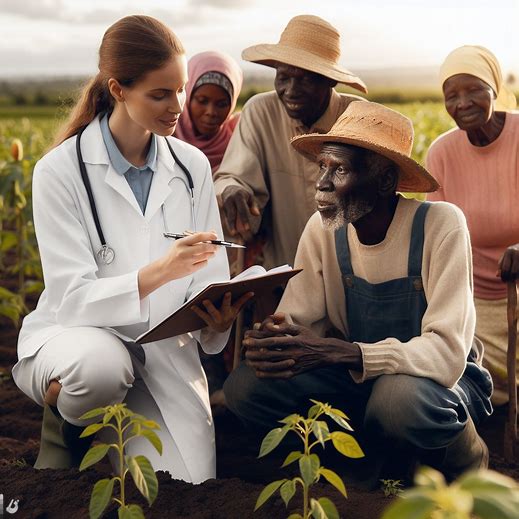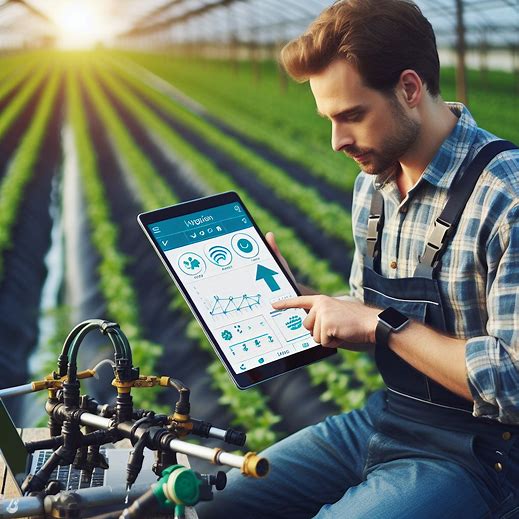Organic farming is a farming system that avoids the use of synthetic pesticides, fertilizers, and genetically modified organisms, and relies on natural, biological, and mechanical methods to maintain soil health, control pests, and enhance crop quality. Organic farming is not only beneficial for the environment, human health, and animal welfare, but also for the farmers’ income and competitiveness. In 2024, organic farming is expected to grow significantly, as more consumers demand organic products, more policies support organic agriculture, and more innovations improve organic practices. In this blog post, we will show you the basics of organic farming, and how you can start or improve your organic farming journey in 2024.
What is Organic Farming?
Organic farming is defined by the International Federation of Organic Agriculture Movements (IFOAM) as “a production system that sustains the health of soils, ecosystems and people. It relies on ecological processes, biodiversity and cycles adapted to local conditions, rather than the use of inputs with adverse effects. Organic agriculture combines tradition, innovation and science to benefit the shared environment and promote fair relationships and a good quality of life for all involved.”1
Organic farming follows four principles, according to IFOAM:
The principle of health: Organic farming should protect and enhance the health of the soil, plants, animals, humans, and the planet, and avoid any harm or pollution.
The principle of ecology: Organic farming should work with nature, rather than against it, and respect the ecological cycles and balances that sustain life.
The principle of fairness: Organic farming should be fair and equitable to all living beings, and ensure that everyone involved in the organic production chain receives a fair share of the benefits and responsibilities.
The principle of care: Organic farming should be careful and precautionary, and avoid any practices that may pose risks or uncertainties to the environment, human health, or animal welfare.
Organic farming is regulated by different standards and certification schemes, depending on the country or region. In the European Union, organic farming is regulated by Regulation (EU) 2018/848, which sets the rules for organic production and labelling, and ensures the quality and credibility of organic products. In the United States, organic farming is regulated by the National Organic Program (NOP), which implements the Organic Foods Production Act of 1990, and in Nigeria, organic farming is regulated by Organic Livestock and Crops Owners Association of Nigeria, and they accredit certifying agents to certify organic farms and businesses.
Organic farming can be applied to different types of crops, livestock, and farming systems, depending on the needs and goals of each farmer. However, some common practices and techniques that are used in organic farming include:
Crop rotation: This is a technique that involves changing the crops grown in a field each season or year, to prevent soil depletion, disrupt pest cycles, and promote nutrient balance.
Cover cropping: This is a technique that involves planting specific crops between main crops, to protect and improve the soil, prevent erosion, and add organic matter.
Mulching: This is a technique that involves covering the soil surface with organic materials, such as straw, leaves, or wood chips, to conserve moisture, regulate temperature, and suppress weeds.
Composting: This is a technique that involves transforming organic waste, such as kitchen scraps, yard trimmings, or animal manure, into nutrient-rich compost that nourishes the soil.
Biological control: This is a technique that involves using natural enemies, such as predators, parasites, or pathogens, to control pests, rather than using chemical pesticides.
Botanical pesticides: These are plant-based substances that have insecticidal, repellent, or antifeedant properties, such as neem oil, garlic, or pyrethrum, that can be used to control pests, while minimizing the harm to beneficial organisms or the environment.
Mechanical control: This is a technique that involves using physical devices or methods, such as traps, barriers, or hand-weeding, to control pests or weeds, without using chemicals.
Intercropping: This is a technique that involves planting different crops together, that have beneficial effects on each other, such as repelling pests, attracting pollinators, or improving soil quality.
Agroforestry: This is a technique that involves integrating trees or shrubs with crops or livestock, to create a diverse and productive system that provides multiple benefits, such as shade, windbreak, or fodder.
Animal husbandry: This is a technique that involves raising animals in a humane and natural way, that respects their behavioural and physiological needs, and provides them with adequate space, feed, water, and health care.
How to Start or Improve Your Organic Farming Journey in 2024?
To start or improve your organic farming journey in 2024, you need to follow some simple steps, such as:
Learn the basics of organic farming: Before you start or improve your organic farming, you need to learn the basics of organic farming, such as the principles, standards, practices, and techniques that are involved. You can use various sources of information, such as books, websites, podcasts, or videos, to learn more about organic farming. For example, you can check out Organic Farming: A Comprehensive Guide, [Organic Farming Magazine], [The Organic Farmer Podcast], or [Organic Farming TV], to get started.
Plan your organic farming goals and strategies: Based on your needs and preferences, you need to plan your organic farming goals and strategies, such as what type of crops or livestock you want to grow, what market or niche you want to target, what resources or inputs you need, and what challenges or risks you may face. You can use various tools, such as [Organic Farm Plan], [Organic Farm Business Plan], [Organic Farm Budget], or [Organic Farm SWOT Analysis], to help you plan your organic farming.
Get certified as an organic farmer: To sell your products as organic, you need to get certified as an organic farmer, by complying with the organic standards and regulations of your country or region, and undergoing an inspection and verification process by an accredited certifying agent. You can use various resources, such as [Organic Certification Guide], [Organic Certification Directory], [Organic Certification Cost-Share Program], or [Organic Certification FAQ], to help you get certified as an organic farmer.
Implement and monitor your organic farming practices: Once you have planned and certified your organic farming, you need to implement and monitor your organic farming practices, such as crop rotation, cover cropping, composting, biological control, etc. You can use various technologies, such as sensors, drones, satellites, GPS, and data analytics, to measure, monitor, and manage your organic farming. You can use various tools, such as [Precision Organic Farming], [Organic Farm Management Software], [Organic Farm Record Keeping], or [Organic Farm Performance Indicators], to help you implement and monitor your organic farming.
Market and sell your organic products: To market and sell your organic products, you need to identify and reach your target customers, communicate your value proposition, and differentiate yourself from your competitors. You can use various channels, such as farmers’ markets, community-supported agriculture (CSA), online platforms, or retail stores, to market and sell your organic products. You can use various tools, such as [Organic Marketing Guide], [Organic Marketing Toolkit], [Organic Marketing Platform], or [Organic Marketing Case Studies], to help you market and sell your organic products.
By following these steps, you can start or improve your organic farming journey in 2024, and enjoy the benefits of this approach.
What are the Benefits of Organic Farming for You and the Planet?
Organic farming can bring various benefits for you and the planet, such as:
Saving money and resources: Organic farming can help you save money and resources, by reducing your dependence on external inputs, such as fertilizers, pesticides, and irrigation, which can be expensive, scarce, or restricted. For example, a study by the Food and Agriculture Organization (FAO) found that organic farming can reduce production costs by up to 30%, while increasing farm income by up to 50%.
Improving productivity and quality: Organic farming can help you improve your crop productivity and quality, by enhancing your crop health, resilience, and diversity. For example, a study by the Research Institute of Organic Agriculture (FiBL) found that organic farming can increase crop yields by up to 20%, while improving crop quality by up to 30%.
Enhancing sustainability and responsibility: Organic farming can help you enhance your sustainability and responsibility, by reducing your environmental impact, human health risks, and social conflicts. For example, a study by the Rodale Institute found that organic farming can reduce greenhouse gas emissions by up to 40%, while improving soil health by up to 70%.
Conclusion
Organic farming is a farming system that avoids the use of synthetic pesticides, fertilizers, and genetically modified organisms, and relies on natural, biological, and mechanical methods to maintain soil health, control pests, and enhance crop quality. Organic farming is not only beneficial for the environment, human health, and animal welfare, but also for the farmers’ income and competitiveness. In 2024, organic farming is expected to grow significantly, as more consumers demand organic products, more policies support organic agriculture, and more innovations improve organic practices. In this blog post, we have shown you the basics of organic farming, and how you can start or improve your organic farming journey in 2024. Whether you are a beginner or an experienced farmer, organic farming can offer you a rewarding and sustainable way of cultivating the land. Join us in embracing organic farming, where chemical-free cultivation is not just a trend, but a lifestyle.



